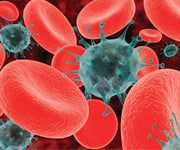Life Extension Magazine®
 | |
Science Journal Estimates Half of all Cancers are Preventable | |
Imagine a world where half the cases of cancer that now exist are suddenly nonexistent. According to a review published in the journal Science Translational Medicine, the idea is not at all far-fetched.* Graham A. Colditz, MD, PhD, and coauthors at Washington University conclude that we now have the knowledge to bring about wide-scale prevention of a disease estimated to kill 577,190 men and women this year in the United States alone. Dr. Colditz and colleagues observe that lifestyle choices play a major role in the development of cancer. Smoking is responsible for a third of all US cancer diagnoses and excess body weight for 20%. Diet, exercise levels, alcohol intake, and other controllable factors are also involved. If our society succeeds in adopting all that is currently known about cancer prevention, these measures will additionally reduce deaths from cardiovascular and other diseases. Editor’s Note: Obstacles outlined in the article include: continued widespread skepticism that cancer can be prevented, short-term focus of cancer research due to the challenge of long- term studies and limited research funding, interventions that are administered too late to prevent the disease, debate concerning the causes of cancer that can overshadow what we do know about risk factors, societal factors such as tobacco policy and government subsidies that fail to discourage unhealthy behavior, lack of interdisciplinary collaboration, and challenges in the implementation of broad changes involving healthcare providers, government regulators, and individual members of society. —D. Dye | |
| Reference | |
| ** Sci Transl Med. 2012 March 28;4(127):127. | |
Mayo Clinic Study finds GLA Inhibits Pancreatic Cancer Cell Growth | |
The results of a study reported by Mayo Clinic pathologist Ruth Lupu, PhD, at the American Association for Cancer Research Annual Meeting 2012 revealed a protective effect for gammalinolenic acid (GLA) against the growth of one type of pancreatic cancer.* Dr. Lupu’s team initially evaluated the effects of GLA in a number of cultured pancreatic cancer cell lines and discovered an inhibitory effect in a subtype that expresses a gene for fatty acid synthase. In earlier research, the team showed that fatty acid synthase is highly expressed in pancreatic adenocarcinomas and may be a marker of poor survival. When GLA was tested in cells with high fatty acid synthase levels, 85% of cancer cell growth was inhibited, which is a significant improvement over gemcitabine, the standard chemotherapy for pancreatic cancer. When the two compounds were combined, the researchers observed a complete inhibition of pancreatic cancer cell growth. Editor’s Note: GLA is an omega-6 fatty acid that is available as a dietary supplement. Fatty acid synthase, which is inhibited by GLA, is also over-expressed in other cancers including prostate. —D. Dye | |
| Reference | |
| * American Association for Cancer Research Annual Meeting 2012, Chicago, March 31-April 4, 2012. | |
Grape Compound May Block the Formation of Fat Cells | |
A recent issue of the Journal of Biological Chemistry published the finding of Purdue University researchers of the ability of a compound known as piceatannol to help prevent the formation of mature fat cells by blocking the pathways needed for their growth.* Piceatannol is an analog of resveratrol, found in grapes and other fruit, which is converted to piceatannol in humans following its consumption. Purdue assistant professor of food science Kee-Hong Kim and his associates tested piceatannol in cultured preadipocytes, which are immature fat cells. These cells pass through several stages before reaching maturity over a ten day or longer period. Dr. Kim’s team found that piceatannol bound to the preadipocytes’ insulin receptors during their initial stage of fat cell formation, which blocked insulin’s ability to control cell cycles and activate genes necessary for the further stages of adipogenesis. Editor’s Note: Dr. Kim hopes to test piceatannol in an animal model as well as find a way to prevent the compound from degrading so that enough is available to the body to prevent fat gain. —D. Dye | |
| Reference | |
| * J Biol Chem. 2012 Mar 30;287(14):11566-78.. | |
Reducing Iron, Adding Antioxidants May Help Prevent Alzheimer’s Disease | |
| A report published in the Journal of Alzheimer’s Disease describes research conducted by Othman Ghribi, PhD, and his associates which suggests that lowering iron levels and supplementing with antioxidants could help protect the brain from some of the changes related to the development of Alzheimer’s disease.* In previous research, Dr. Ghribi’s team demonstrated that the intake of a high cholesterol diet results in Alzheimer’s disease-like changes and iron deposition in the brains of experimental animals. In the current study, rabbits were given a high cholesterol diet for 12 weeks, which resulted in the formation of brain plaques containing the protein amyloid beta, which is a characteristic of Alzheimer’s disease. The animals also underwent increased phosphorylation of a protein in the brain’s neurons known as tau, which is another hallmark of the disease. When some of the rabbits were treated with the iron-chelating agent deferiprone, plasma cholesterol and iron levels were lowered, and even though brain iron levels were not also reduced, amyloid beta and phosphorylated tau were significantly decreased. Editor’s Note: Treatment with deferiprone did not reduce levels of reactive oxygen species (whose generation by iron causes damage to neurons) in comparison with untreated animals. “It is possible that a higher dose of deferiprone, or combination therapy of deferiprone together with an antioxidant to prevent reactive oxygen species generation would more fully protect against the deleterious effects of cholesterol-enriched diet that are relevant to Alzheimer’s disease pathology,” Dr. Ghribi remarked. —D. Dye | |
| Reference | |
| * J Alzheimers Dis. 2012 Mar 9. | |
Improved Folate Intake During Young Adulthood Reduces the Incidence of Hypertension Later | |
A study reported in the American Journal of Clinical Nutrition found that young adults who had a higher intake of folate experienced a significantly lower risk of developing high blood pressure over a 20-year follow-up period. Pengchung Xun and colleagues evaluated data from 4,400 African American and Caucasian men and women who enrolled in the Coronary Artery Risk Development in Young Adults Study in 1985. Dietary questionnaires were analyzed for total folate intake from dietary and supplemental sources, and blood pressure was assessed at the beginning of the study and at follow-up visits. Nine hundred eighty-nine cases of hypertension were diagnosed over the 20-year follow-up. Men and women whose folate levels were among the top one-fifth of participants had a 52% lower incidence of hypertension compared to those whose intake was among the lowest fifth. Editor’s Note: When participants were examined by race, Caucasians who were among the top one-fifth of folate intake had a 67% lower risk and African Americans had a 46% lower risk of having high blood pressure in comparison with the lowest groups. —D. Dye | |
| Reference | |
| * Am J Clin Nutr. 2012 Apr 4. | |
High Fiber Diet Associated with Cardioprotective Benefit in Women | |
An article published recently in the journal PLoS One revealed a protective effect for fiber against ischemic cardiovascular disease in women. Peter Wallström of Lund University and his associates evaluated data from 8,139 men and 12,535 women who participated in the Swedish population-based Malmö Diet and Cancer cohort, which enrolled residents of Malmö, Sweden, between 1991 and 1996. Interview responses and seven-day dietary records were analyzed for the intake of energy, fats, fiber, carbohydrates, and other macronutrients. Participants were followed for an average of 13.5 years, during which 1,089 men and 687 women developed ischemic cardiovascular disease. While no significant associations were found between cardiovascular disease and fat or other dietary components, women whose fiber intake was among the top one-fifth of subjects had a 24% lower risk of ischemic cardiovascular disease compared to those whose intake was among the lowest fifth. Editor’s Note: For men, having a fiber intake that was among the top fifth was associated with a 31% lower adjusted risk of ischemic stroke. Although the researchers are uncertain about the reason for the gender difference, they suggest that women may consume healthier fiber sources, in the form of fruit and vegetables, compared to men, whose primary source of fiber in this study was bread. —D. Dye | |
| Reference | |
| * PLoS One. 2012 Feb 27 | |
Metformin Helps Some Cancer Patients | |
| An article written by Christian Nordqvist in Medical News Today summarizes the recent findings presented at an American Association for Cancer Research meeting, where scientists revealed that according to studies “a popular diabetes drug, metformin, appears to help patients with several types of cancer, including cancer of the prostate, liver, and pancreas.”* Dr. Michael Pollak, professor of oncology and of medicine at McGill University in Montreal, and co-author in the prostate cancer trial, says further studies need to determine metformin’s safety and efficacy, as well as finding out what the ideal dosages might be. Experts are not sure whether a metformin derivative might be better than the drug itself for cancer treatment. Senior author of the study involving metformin and liver cancer, Geoffrey D. Girnun, PhD, stated: “Our research demonstrated that metformin prevents primary liver cancer in animal models. Mice treated with metformin had significantly smaller and fewer tumors than those who did not receive the medication. Based on these findings, we believe metformin should be evaluated as a preventive agent in people who are at high risk. Many patients with diabetes already are taking this medication, with few side effects.” —M. Richmond | |
| Reference | |
| * http://www.medicalnewstoday.com/articles/243718.php. Accessed April 23, 2012. | |
Life Extension Pharmacy Offers Cutting Edge New Aspirin Test | |
Aspirin is frequently called the “wonder drug” because of its many beneficial properties. One of its most amazing effects is to make blood platelets less sticky, which helps prevent blood clots from forming. If blood clots can’t form within the arteries, blood flows more freely, and the risk of heart attack and stroke is reduced. More than 43 million people in the US take aspirin daily to help prevent heart attacks and strokes. However, research has demonstrated that about 25% of individuals are resistant to the beneficial effect of aspirin. And if you’re aspirin-resistant, taking it daily has no effect whatsoever on your risk of a cardiac event. In fact, individuals that are aspirin-resistant are over three times more likely to die from a heart attack or stroke. Until recently, there was no quick, accurate, effective way to test for aspirin effect. Now, with the AspirinWorks™ Test, you can be sure your aspirin is working. This test requires the collection of a simple random urine sample which measures thromboxane, the target of aspirin therapy. The AspirinWorks™ Test is available through Life Extension®. Members may order the test for $111.75 during the annual Blood Test Super Sale. Alternatively, the AspirinWorks™ Test may be obtained through your physician and is typically reimbursed through most insurance carriers or covered under Medicare. To order your Aspirin-Works™ Test or for more information please contact a Life Extension Health Advisor at 1-866-864-3027. —S. Fogle, ND | |
Consumption Of Cruciferous Vegetables Linked To Improved Breast Cancer Survival Rates | |
Eating cruciferous vegetables after breast cancer diagnosis was associated with improved survival among Chinese women, according to results presented at the American Association for Cancer Research Annual Meeting.* “Breast cancer survivors can follow the general nutritional guidelines of eating vegetables daily and may consider increasing intake of cruciferous vegetables, such as greens, cabbage, cauliflower and broccoli, as part of a healthy diet,” said Sarah J. Nechuta, MPH, PhD, a postdoctoral research fellow at Vanderbilt University in Nashville, Tenn. She and her colleagues investigated the role of cruciferous vegetables in breast cancer survival in the Shanghai Breast Cancer Survival Study, a prospective study of 4,886 Chinese breast cancer survivors diagnosed with stage 1 to stage 4 breast cancer from 2002 to 2006. After adjusting for demographics, clinical characteristics and lifestyle factors, the researchers found cruciferous vegetable intake during the first 36 months after breast cancer diagnosis was associated with a reduced risk for total mortality, breast cancer-specific mortality and recurrence in a dose-response pattern. “Commonly consumed cruciferous vegetables in China include turnips, Chinese cabbage/bok choy and greens, while broccoli and Brussels sprouts are the more commonly consumed cruciferous vegetables in the United States and other Western countries,” she said. “Second, the amount of intake among Chinese women is much higher than that of US women. The level of bioactive compounds such as isothiocyanates and indoles, proposed to play a role in the anticancer effects of cruciferous vegetables, depend on both the amount and type of cruciferous vegetables consumed.” Editor’s Note: Life Extension® has long understood the role cruciferous vegetables play in a healthy diet as well as a cancer preventive diet. This is one of the many reasons we created our line of Cruciferous Vegetable Soups, to provide a delicious and nutritious way for members to get their daily intake of many potent vegetables. —M. Richmond | |
| Reference | |
| * http://www.aacr.org/home/public--media/aacr-press-releases.aspx?d=2779. Accessed, April 23, 2012 |








